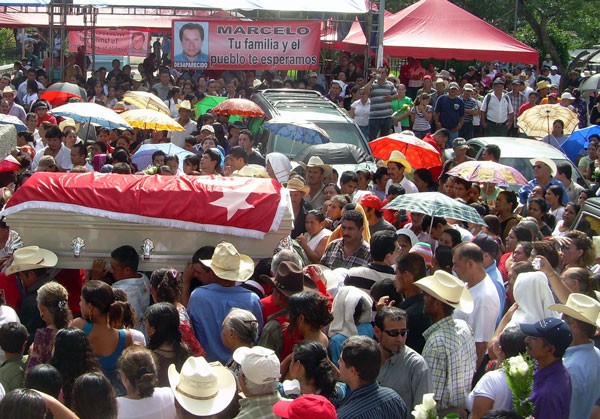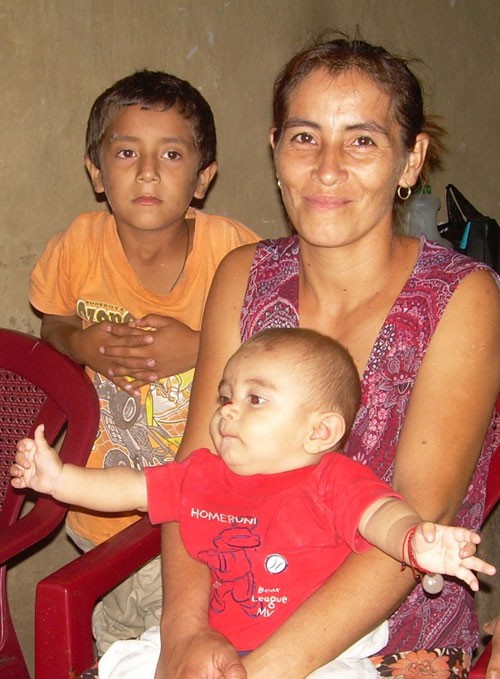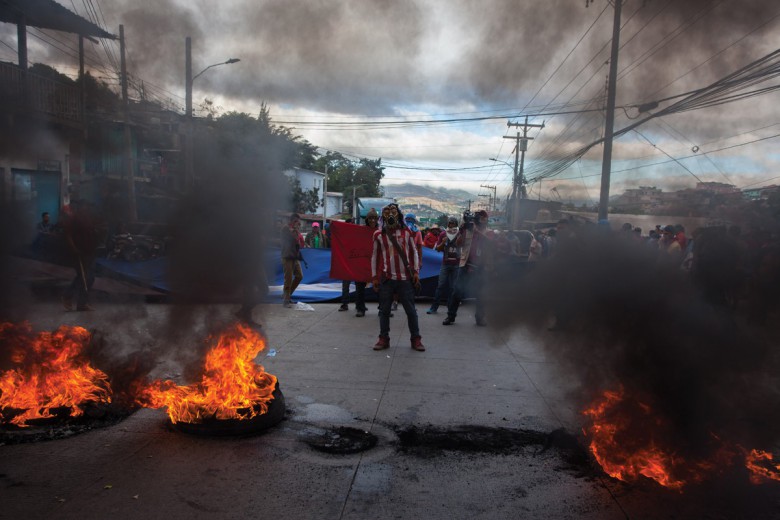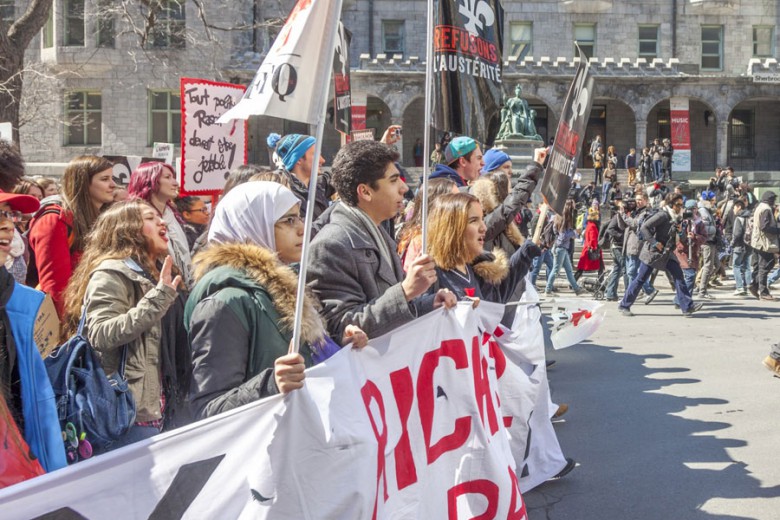
In late August 2011, I sat in a meeting room in the Intercontinental Hotel in San Salvador. It was packed with hundreds of farmers, high-school students and working people, some of whom had travelled from distant rural communities to participate in a forum on metallic mining in El Salvador. Following speeches from a panel of politicians, including Lina Pohl, the Salvadoran vice-minister of the environment, a man from the back of the room spoke into a microphone, echoing the unanimous position of community members present that gold mining must be prohibited in the country. “We may be poor,” he said, “but we are not ignorant. We are humble of heart, but we are not stupid.”
The women and men of El Salvador struggle with the legacies of military repression, armed conflict, neoliberal trade policies and the culture of impunity that continues to flourish in the tiny Central American republic. Yet, Salvadorans active in social movements persistently demonstrate deep commitment to protecting the life of their communities. “Power is built; nobody will give it to you. You must build it in every moment,” said an environmental activist I met in 2004.
The Salvadoran people’s spirit of resistance is being tested once again in the legal battle against Canadian mining company Pacific Rim. In 2009, the Salvadoran government refused to grant the company a licence to exploit its two proposed gold mining projects, citing the company’s failure to meet environmental assessment requirements. Now the firm is suing El Salvador for $77 million in a World Bank tribunal under the terms of the Central American Free Trade Agreement.
On the ground in the region of Cabañas, where Pacific Rim’s sights lie, another facet of the conflict is unfolding. This June, the body of environmental activist Juan Francisco Duran Ayala was exhumed from a common grave in San Salvador. Unable to identify his remains, the National Civilian Police had interred Ayala’s body there. He was the third activist from the area surrounding the proposed mine sites to be killed in a fashion reminiscent of the right-wing death squad activity of the 1980s when thousands of students, labour leaders and activists were abducted, tortured and killed, or else simply disappeared.
El Dorado
Two days after attending the mining forum in San Salvador, I hitch a ride to Cabañas with a friend who works in the district surrounding the larger of Pacific Rim’s two proposed gold mines. The drive from El Salvador’s capital city to Cabañas reveals much about what community organizer Marvin Guillermo Orellana calls “the most forgotten” region in the country. As a sign on the main highway indicates the turnoff for Ilobasco, Orellana’s hometown, his words begin to resonate. The roads are treacherous; it is necessary to weave between potholes as large as vehicles, sometimes by swerving into the oncoming lane. The stark level of poverty in this municipality is at odds with what lies beneath its dusty and deforested clay earth: some of the richest deposits of gold in Central America.
Just outside the village of San Isidro, a sign stands on the side of the highway bearing the name Pacific Rim and a claim to “Socially and Environmentally Responsible Mining.” This is El Dorado, the property where the Canadian corporation has identified gold deposits totalling 1.4 million ounces. From the road, the site appears no different from any other property in the area, but as I approach the metal gate that cuts across the laneway, a security guard emerges from his small post. Curious visitors do not appear to be welcome here.
Many of the communities here have been repopulated after thousands of refugees fled across the Rio Lempa during the early 1980s to Honduras, with aerial assaults by the military resulting in hundreds of casualties as entire villages attempted to cross the border to safety. The same river that once ran red from so many deaths is also a symbol of life for the region. Pacific Rim’s plan to extract precious metal from rock using a cyanide leaching process poses grave threats to environmental and human health – threats that are compounded by El Dorado’s position upstream from the major source of freshwater for El Salvador. Skin disease, miscarriages and the death of livestock are among the documented effects of contamination from this process. El Salvador is also one of the most seismically active countries in the Americas. Reassurances offered by corporate representatives that waste water pools lined with non-degradable materials will prevent contamination of the Rio Lempa in perpetuity ring hollow to the ears of many in the affected area.
Depoliticizing the murders
Zenayda Serrano Iraheta was a lawyer working in the attorney general’s office in Cabañas when Marcelo Rivera, a community leader from San Isidro, disappeared. Rivera’s body was recovered 12 days later in the bottom of a 100-foot well. His hair and toenails had been removed, his trachea crushed. The autopsy report concluded that Rivera was killed in a drunken brawl, the signs of torture on his body mere indications of decomposition. For testifying that the investigation was corrupt and inaccurate and for pressing for an independent investigation consistent with the facts of Rivera’s death, Iraheta was fired from her position. Evidence and equipment were stolen from her office, and, in response to a stream of death threats, she and her husband moved with their young child to San Salvador for greater security.
Friends and family of Rivera knew that something was wrong with the autopsy findings. “For one thing, Rivera didn’t drink alcohol,” Rina Navarrete recalls. I met with her in the sparsely furnished office of ASIC, the Friends of San Isidro Cabañas, which has been leading the campaign against Pacific Rim in the community. Now director of the organization, the young mother was recruited to the cause personally by Rivera the week that he disappeared. Two years have passed, yet her grief is palpable. “There are some things about this that you just cannot say,” she remarks, referring to the crippling sadness of losing a charismatic leader who was also a lifelong friend.

The tactic of depoliticizing the murders of anti-mining activists has been used repeatedly over the past two years, with local investigations concluding that familial disputes involving alcohol resulted in the deaths of activists Ramiro Rivera (no relation to Marcelo) and Dora “Alicia” Sorto Recinos, who was eight months pregnant when she was fatally shot in 2009. Early investigations into the recent killing of Juan Francisco Duran Ayala attempted to link his death to gang activity. Although gang violence is ubiquitous in El Salvador, it seems unlikely to those who knew Ayala that gangs had anything to do with his disappearance.
“The police said he must have been connected to the MS [the Mara Salvatrucha, one of El Salvador’s rival gangs] because he had a tattoo,” Navarrete recounts. “But it was a tattoo of Che Guevara.” From the perspective of those who worked with Ayala, it is more likely that his demise was politically motivated. The last night he was seen alive, Ayala and his friends were followed by police while putting up posters for an anti-mining workshop.
Pacific Rim has resisted any association with the repression of anti-mining activists in Cabañas. In a statement released two weeks after the discovery of Ayala’s body, the company denounced an “opposition leadership” for making libelous accusations against them and delivered an unexpected deflection. Magnifying the gravity of property damage and alleged threats against company employees in contrast to this string of grisly homicides, Pacific Rim’s statement reads: “We have never retaliated against those who have perpetrated violence against us.”
Mining on trial
Pacific Rim’s claim against the Republic of El Salvador is being heard in a World Bank tribunal in Washington, D.C. El Salvador has raised compelling arguments that Pacific Rim, a wholly Canadian-owned corporation that recently acquired a Nevada subsidiary to bring itself within the ambit of the United States-Central America Free Trade Agreement (CAFTA), has no jurisdiction to make their claim.
After decades of dictatorship and armed struggle in El Salvador, democratic institutions are still emerging. The communities most at risk from the harms of metallic mining are not assured that their concerns will be adequately represented by their government. As a result, a national coalition of community groups has made submissions to the tribunal expressing environmental and social concerns, like the severe water shortages in the country, doubts that the affected communities are adequately informed regarding the decision to support mining in their territories, and questions about whether affected communities have the political capital to participate in the public policy debate surrounding mining.
Constitutional scholars in El Salvador have raised uncertainty as to the legality of CAFTA’s ratification in the country. Even while the terms of the agreement were being negotiated, opposition among Salvadorans to becoming a party to free trade with the United States was widespread. A farmer and ex-combatant I met in 2004 explained the reasoning behind this reticence: “Free trade is a shot in the head to Central America,” he stated plainly. “People will die when CAFTA is ratified. I’ve survived 12 years of civil war, displacement and an injury, a hurricane and two earthquakes, but the free trade agreements will leave us powerless to change anything. And the power we have gained will be lost to the megaprojects of American entrepreneurs.”
These words proved prophetic – the megaprojects he foresaw are well under way. In addition to the 29 mining projects scattered across the northeastern edge of the country, all currently in the exploration stage, the construction of the Carretera Longitudinal del Norte (Northern Longitudinal Highway) rumbles ahead, carving its way from Santa Ana in the southeast to the mountains of Chalatenango where it meets the Honduran border. The towns in Cabañas affected by Pacific Rim’s proposed mining development lie directly in its path. Under the free trade agenda, the governments of impoverished Central American countries foot the bill for development projects designed to suck resources out of the region, with capital and benefits flowing in one direction, and displacement and contamination flowing in the other.
By its own estimates, Pacific Rim stands to gross trillions of dollars if given the opportunity to extract gold deposits at the El Dorado and Santa Rita sites. Gold extraction is on hold in El Salvador for the moment, but as the price of this commodity continues to ascend and pressures to exploit this resource increase, it is unclear how long the government will maintain its moratorium on mining.
The culture of impunity that has been allowed to continue in El Salvador makes activists who speak out against lucrative development projects particularly vulnerable. While the government of El Salvador makes headway in the international investment dispute, arguing that Pacific Rim has no jurisdiction to bring its claim against the country, political corruption on the local level in Cabañas allows the intimidation, death threats and disappearances of anti-mining activists to be dismissed by local institutions. Pacific Rim maintains that it bears no responsibility for the violence targeted at those who oppose its presence in the region. However, the lack of independent investigations into the deaths of activists there means that the truth about who perpetrated the crimes remains buried. The murders of anti-mining activists in Cabañas are one tangible manifestation of the lack of respect for individual and collective rights in the face of highly lucrative development projects.
Salvadorans have made untold sacrifices for the chance to participate in the decisions that affect their lives. Their suffering has forged in them the understanding that power is not given, that it must be built in every moment. With remarkable resilience, their struggle for self-determination continues.
This article’s byline was changed to be anonymous in January 2019 at the author’s request.






